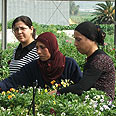
Only 27% of Israeli Arab women work (archives)
Photo: Danny Ben Simhon
A new report about Israel
released by the Organization for Economic Co-operation and Development (OECD) states that "more than half of the Arab and haredi populations live in poverty which is largely explained by the low employment rates of haredi men (45%) and Arab women (27%), as well as the greater prevalence of large families among the population groups."
Particularly strong criticism was directed at the haredi community due to haredi education which does not provide young male haredi with the "skills in English, science or math that would help them to participate successfully in the labor market." Thus, the haredi community is sentencing its own members to harsh poverty.
The OECD harshly criticizes Israel for only partially implementing the organization's recommendations in 2010 for the integration of haredim and Arabs into the labor market.
National Target
Noam Barkan
Research conducted by Ministry of Economy reveals 25% of graduates of IDF program for haredi men are employed in banking, financial services sectors
Due to the inadequate education in terms of core subject and the failure to sufficient professional studies in the Arab sector as well, the high poverty rates in Israel, 21%, which put the country in the last place among OECD members, may not improve.
The report stresses, however, that the poverty rates among the rest of the population in Israel are in accordance with the average rate in the other OECD countries, and that for that reason Israel must make an effort to bring the Arab and haredi population to the poverty rates of the rest of the population in Israel, which stand at about 12%.
The report further notes that Arabs and haredim, due to their lack of working skills, earn just 55-70% of the wages of Israel's other populations.
The report rejects the claim made by haredi leaders that intensive study of religious texts trains mental capacities that compensate for the absence or only light coverage of core subjects. Because of insufficient participation among male haredi students, the report says, it is impossible to test the hypothesis using for example PISA scores.
The OECD report further criticizes the State of Israel for not investing sufficient resources in programs encouraging employment for unemployed and job seekers, after Employment Service budgets have been cut in recent years and the Wisconsin Plan was cancelled three years ago.
The report also reveals that the public spending on vocational rehabilitation is only 1% of Israel's gross domestic product compared to a double rate in the rest of the organization's members.















